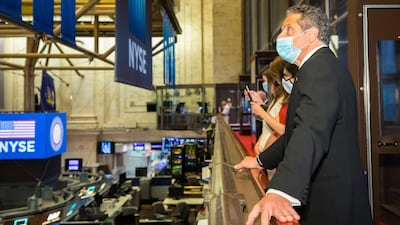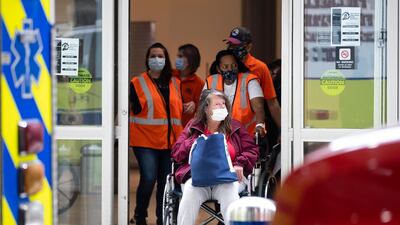The US surpassed 100,000 deaths on Wednesday, a sobering milestone in its fight against the coronavirus pandemic.
Three months after the first death was reported from Covid-19 in the US on February 29, the pandemic has infected nearly 1.7 million people in the country and taken the lives of 100,047, a tracker run by the Johns Hopkins University reported.
It also means that almost one in every three deaths around the world occurred in America.
More people have died in the US of Covid-19 than the number of soldiers the country lost in the Vietnam, Afghanistan and Iraq wars combined.
Even with US health officials warning since March that the country was on course to hit 100,000 fatalities, the milestone reinforced the effect that the pandemic has had on the country, with no vaccine yet in sight.
Close to 39 million people have lost their jobs in the US and unemployment is now close to 14.7 per cent, Kevin Hassett, a White House economic adviser, told CNN last week.
It is the largest and fastest rise in jobless figures for decades.
Robert Redfield, director of the Centres for Disease Control, tweeted on May 15 that based on 12 different models, the death toll will continue to climb amid fears of a second wave in September.
But even with the grim reality, US President Donald Trump appeared more focused on assailing his opponents on social media than unifying the country.
Mr Trump's Twitter tirades have increased in recent days, with attacks on former Democratic candidate Hillary Clinton, Democratic nominee Joe Biden, his former attorney general Jeff Sessions and the governors of California and North Carolina.
He has attacked MSNBC host Joe Scarborough, mail voting and even his most supportive mainstream TV station, Fox News.
Mr Trump's offensive rejected any blame for the number of deaths or accusations he refused to act early during the pandemic.
A study by Columbia University this month projected that at least 36,000 lives could have been saved if the lockdowns were imposed earlier.
At the weekend, Mr Trump attacked the prominent university behind the study.
"Columbia is a liberal, disgraceful institution to write that because all the people that they cater to were months after me. They said we shouldn't close it," he told Sinclair media.
Mr Trump is showing increasing concern that the death toll and economic downturn may cost him the election against Mr Biden on November 3.
National and swing states polls give the Democratic candidate an edge five months before the vote begins.
The Trump administration's messages, mainly blaming China and the World Health Organisation, have not improved polling numbers.
A Fox News poll last week showed voters have more trust in Mr Biden on health care than Mr Trump, by a 17-point-margin.
On Covid-19, the Democrat is ahead by 9 points and in relations with China by 6 points.
These numbers are also starting to worry Republicans running for the Senate in swing states such as Arizona and North Carolina, where Mr Trump's popularity dip is hurting them.
But with some states gradually reopening and the stock market showing signs of recovery, Mr Trump and his campaign are hoping the pandemic and their handling of the crisis may be far behind them by November.














